|
|
|
Sort Order |
|
|
|
Items / Page
|
|
|
|
|
|
|
| Srl | Item |
| 1 |
ID:
114095
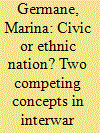

|
|
|
|
|
| Publication |
2012.
|
| Summary/Abstract |
This article examines the historical development of the two different concepts of the Latvian nation: the one that included the equal participation of all ethnic groups residing in Latvia, and the one that put them at the margins of the new state. In 1919, citizenship was granted to all Latvian residents irrespective of their ethnicity, while the Law on Minorities' Schools established a framework for cultural autonomy. National unity was perceived as being crucial to state independence, and remained central to political debates in the first republic. However, similarly to elsewhere in Central and Eastern Europe, the creation of the political nation faced a number of serious domestic and international challenges. The worldwide economic depression and the parliamentary crisis of the 1930s finally tipped the scale in favour of the ethnic version of the Latvian nation. Nevertheless, even seventy years later, the brave multicultural experiment in this small Baltic country resonates with modern debates on nation-building and minority rights.
|
|
|
|
|
|
|
|
|
|
|
|
|
|
|
|
| 2 |
ID:
133797
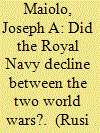

|
|
|
|
|
| Publication |
2014.
|
| Summary/Abstract |
The early setbacks suffered by the Royal Navy during the Second World War have long coloured historians' assessments of the navy's standing during the interwar years, with a consensus settling around a narrative of decline. Yet Joseph A Maiolo argues that, following the strategic victory of the First World War, the Admiralty manoeuvred with great agility to respond to, and curtail, the rise of other naval powers such as the US, Japan and Germany without setting in motion another naval arms race. The result was that by 1939, the Royal Navy was well positioned to play its part in the second global conflict of the twentieth century
|
|
|
|
|
|
|
|
|
|
|
|
|
|
|
|
| 3 |
ID:
102444
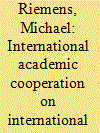

|
|
|
|
|
| Publication |
2011.
|
| Summary/Abstract |
Based on considerable archival research in Switzerland and France, this article considers the creation of specialised institutions and centres for scientific research, discussion and information on international questions after the First World War. It analyses the origins and development of the International Studies Conference from 1928 until 1946, and it pays particular attention to the institutional setting provided by the ISC. With the help of an international questionnaire of the League of Nations from the early 1930s the article also discusses the university teaching of IR in the US, Great Britain and on the European continent in the interwar period, and it looks at some of the institutional settings, especially academic institutions (departments, chairs, schools and so on), that were available at the time.
|
|
|
|
|
|
|
|
|
|
|
|
|
|
|
|
| 4 |
ID:
141761
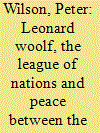

|
|
|
|
|
| Summary/Abstract |
Co-founding The Political Quarterly was one among many of Leonard Woolf's achievements during a long career as a progressive political thinker and publicist, particularly in the field of international affairs. To mark the centenary of the publication of International Government, his most innovative and influential work on the subject, this article seeks to assess Woolf's contribution. It examines the Fabian background to Woolf's work, his support for and approach to the League of Nations and his commitment to collective security as an approach to peace. Through a broader understanding of the League it argues that certain failings in the area of collective security, however profound, should not be permitted to blight an otherwise impressive intellectual legacy.
|
|
|
|
|
|
|
|
|
|
|
|
|
|
|
|
| 5 |
ID:
164400
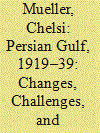

|
|
|
|
|
| Summary/Abstract |
The interwar period (1919–39) was a formative period in the Persian Gulf. These years marked a transition from a Gulf society once characterized by symbiosis and interdependency to a sub-region characterized by national divisions, sectarian suspicions, rivalries and political tension. This period witnessed a surge of anti-colonial and nationalist feeling in Iran, the rise of a stridently nationalist military leader in the person of Reza Shah Pahlavi, his implementation of an assertive Persian Gulf policy and his re-assertion of Iran’s claims to coastal territories ruled by Arab shaykhs under British protection. The challenge posed by ascendant Iran to Britain’s dominant position in the Persian Gulf generated an abrupt shift from indirect to direct forms of colonial penetration in the Gulf Arab shaykhdoms and a transfer of Britain’s locus of power from the Iranian to the Arabian littoral. This article surveys the wide-ranging political, economic and social processes that transformed the Persian Gulf community into a sub-region of Arab-Iranian rivalry during the interwar period.
|
|
|
|
|
|
|
|
|
|
|
|
|
|
|
|
| 6 |
ID:
183744
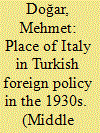

|
|
|
|
|
| Summary/Abstract |
For many scholars working on Turkish foreign policy in the 1930s, Italy is taken as the greatest threat to the newly-established Republic and one that dominated Turkish foreign policy making in this period. Italy did adopt a threating stance with the Italian occupation of the Dodecanese islands and its expansionist aims in Asia and Africa, which were a cause of concern for the Turkish government. A re-examination of the Turkish-Italian political and economic relations within the broader context of the Mediterranean and the great power politics of the period, however, demonstrates that the bilateral relations, at least officially, functioned without any significant and lasting crisis until the Italian invasion of Albania in 1939. What motivated and drove Turkish thinking and decision-making in the international arena was not Italy’s actions per se but the insecurity in the Mediterranean and beyond of which Italy was a part.
|
|
|
|
|
|
|
|
|
|
|
|
|
|
|
|
| 7 |
ID:
158183
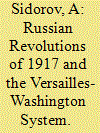

|
|
|
|
|
| Summary/Abstract |
THE GREAT RUSSIAN REVOLUTION echoed far and wide. The revolution of February 1917 catastrophically undermined Russia's international positions; the revolution of October 1917 shifted its foreign policy vector by pushing it out of the coalitions trapped in World War I. The centenary of the events that changed the course of Russian and world history has given us another chance to ponder on how they affected the postwar international order known as the Versailles-Washington system.
|
|
|
|
|
|
|
|
|
|
|
|
|
|
|
|
| 8 |
ID:
111921
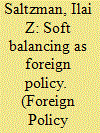

|
|
|
|
|
| Publication |
2012.
|
| Summary/Abstract |
In an attempt to increase the legitimacy and traction of soft balancing in contemporary International Relations (IR) scholarship, and in order to rebuff critiques of its applicability, the concept is further clarified and applied to examine American foreign policy vis-à-vis Japan in the interwar period. Analysis reveals that soft balancing is not only a legitimate explanation, but also explains a major historical and theoretical puzzle-American grand strategy vis-à-vis Japan in interwar period-it shows that the concept is also applicable to account for patterns in non-unipolar systems.
|
|
|
|
|
|
|
|
|
|
|
|
|
|
|
|
| 9 |
ID:
192316
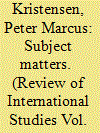

|
|
|
|
|
| Summary/Abstract |
This article contributes to the critical historical research that has demythologised the ‘noble origins’ of the International Relations discipline (IR) by exposing its imperial, colonial, and racist legacies. Where most critical historiographies have unveiled the centrality of racialised and imperialist ontologies in individual thinkers and theories, this article traces imperialist origins of international thought by reconstructing its impact on administrative-institutional infrastructures. Specifically, it interrogates the most systematic and institutionalised attempt to define the ‘subject matter’ of IR under the International Studies Conference (ISC) organised by the International Institute of Intellectual Cooperation (IIIC) of the League of Nations. Through a parallel reading of the archives from ISC's ‘administrative meetings’ and ‘study meetings’, the article contends that the seemingly academic discussions on the subject matter of IR in the ‘administrative meetings’ were in fact intertwined with the imperialist-colonial politics central to ‘study meetings’. The article thus not only challenges IR's conventional history, but its historical ontologies by revealing how race and empire were central to the constitution of its very subject matter and its early institutionalisation.
|
|
|
|
|
|
|
|
|
|
|
|
|
|
|
|
| 10 |
ID:
094812
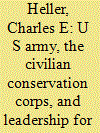

|
|
|
|
|
| Publication |
2010.
|
| Summary/Abstract |
Prior to World War II, the U.S. Army numbered 187,000 soldiers. Its growth to more than 8 million was a significant accomplishment. Little known to most, the Franklin D. Roosevelt administration's youth program, the Civilian Conservation Corps (CCC), provided the pretrained manpower to fill the U.S. Army's ranks upon mobilization with men who readily assumed the role of Non-Commissioned Officers (NCOs). It also gave Organized Reserve Corps officers the opportunity to occupy leadership positions, an experience that would have been unavailable otherwise. By the same token, it allowed the Regular Army to assess the leadership potential of both Regular and Reserve Officers in leading future citizen soldiers. Last, it provided the Army with an opportunity to exercise its mobilization plans.
|
|
|
|
|
|
|
|
|
|
|
|
|
|
|
|
| 11 |
ID:
168870
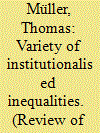

|
|
|
|
|
| Summary/Abstract |
This article argues that the research on institutionalised inequalities pays too little attention to competing understandings of stratification and the variety of interlinkages between the patterns of stratification and the institutions of international society. Building on the English School and theories of stratification, it develops an analytical framework that conceptualises these ‘stratificatory interlinkages’ as a twofold decision: firstly for a coupling – instead of a decoupling – of institutional characteristics to patterns of stratification and secondly for a specific classification scheme and type of interlinkage. The article draws on empirical examples from the League of Nations and other interwar international institutions to demonstrate that different understandings of stratification and classification schemes were used for different institutional purposes, for example, voting rights and the apportionment of budget expenses. In addition, it proposes four analytical dimensions that allow mapping the variety of classification schemes and types of interlinkages that were chosen for institutionalised inequalities. The dimensions relate to the composition of the reference group, the decision-making about the classification scheme, the institutional purposes, and the institutional form of the interlinkage. The variety of stratificatory interlinkages entails a more variable and diverse relation between stratification and institutions than usually assumed.
|
|
|
|
|
|
|
|
|
|
|
|
|
|
|
|
| 12 |
ID:
093095
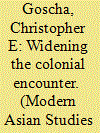

|
|
|
|
|
| Publication |
2009.
|
| Summary/Abstract |
Relying on three inter-Asian colonial debates from French Indochina, this paper attempts to widen our analytical approach to the study of colonialism in Indochina beyond the 'colonizer'-'colonized' opposition by factoring in the relationships among the diverse Asian colonized living within the colonial state without downplaying the important role Western colonialism played in transforming those very relationships or being affected by them. The French Indochinese case is helpful, for it suggests that inter-Asian connections did anything vanish, but rather intensified because of the colonial experience. Numerous Lao, Khmer, Vietnamese and Chinese subject elites continued to engage each other and the French in fascinating and sometimes heated debates about the political, legal, cultural and economic place each group held in French Indochina - or did not want to hold. This directly affected how they came to interact with one another in new ways, essential to understanding the complexity of the colonial encounter at the time and can provide new insights into post-colonial and international history. Lastly, this wider approach to studying the colonial encounter allows us to view the French side of the colonial equation from a new vantage point.
|
|
|
|
|
|
|
|
|
|
|
|
|
|
|
|
|
|
|
|
|